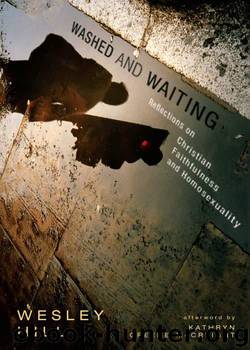Washed and Waiting: Reflections on Christian Faithfulness and Homosexuality by Hill Wesley

Author:Hill, Wesley [Hill, Wesley]
Language: eng
Format: mobi, epub
Publisher: Zondervan
Published: 2010-09-20T16:00:00+00:00
From the first time I picked up a copy of Nouwen’s The Return of the Prodigal Son to the time I happened on his biography one afternoon in a seminary library in Minnesota, I have felt an uncanny affinity with Henri Nouwen. My parents still have an audio cassette recording of me preaching a sermon to a congregation of stuffed animals in my bedroom when I was six years old; Nouwen, at age five, played the part of a priest, saying Mass with a toy altar and specially made child-size vestments.17 Growing up, I was the morally upright oldest child, ever dutiful to my parents and mindful of my church’s expectations; Nouwen, too, fit the role of the faultless older brother, never stepping out of line, always aiming to please. I came to realize that, from an early age, I had had a homosexual orientation; Nouwen also, later in life, arrived at the point of acknowledging to a select few that he was gay and had been so since childhood.
Loneliness, as I will try to describe more fully in the next chapter, has been a defining struggle of my life. I think it is probably rooted, in a profound yet mysterious way, in my homosexuality. And in this, too, I sense an astonishing resemblance between my experience and Nouwen’s.
In his classic work The Wounded Healer, Nouwen describes central, character-shaping desires he achingly experienced from the time he was very young until the day he died—desires for love, affection, companionship, permanent intimacy, life-giving community, a deep sense of belonging, a safe haven, a home. On the flip side, those desires, going unfulfilled, became wounds of rejection, alienation, and isolation. I know well these desires and wounds because, like Nouwen, I have lived with them. I am now living with them.
The wound of loneliness is like the Grand Canyon, Nouwen wrote, “a deep incision on the surface of our existence which has become an inexhaustible source of beauty and self-understanding.”18 With this statement Nouwen gave voice to the truth of the gospel that, under God’s severe mercy, evil may be turned to good, pain and suffering may be redeemed and transformed, beauty may spring from ashes. “And we know that in all things God works for the good of those who love him, who have been called according to his purpose” (Romans 8:28 NIV). Through the incision—though not beautiful in and of itself—we may glimpse the beauty of God.
Nearly two thousand years ago, Good Friday gave way to Easter Sunday, and at the end of history, when Jesus appears, death will give way to resurrection on a cosmic scale and the old creation will be freed from its bondage to decay as the new is ushered in. On that day there will be no more loneliness. The wounds will be healed. I expect to stand with Henri Nouwen at the resurrection and marvel that neither of us is homosexual anymore, that we both—together with every other homosexual Christian—are whole and complete in the fellowship of the redeemed, finally at home with the Father.
Download
Washed and Waiting: Reflections on Christian Faithfulness and Homosexuality by Hill Wesley.epub
This site does not store any files on its server. We only index and link to content provided by other sites. Please contact the content providers to delete copyright contents if any and email us, we'll remove relevant links or contents immediately.
The 5 Love Languages: The Secret to Love That Lasts by Gary Chapman(9767)
The Space Between by Michelle L. Teichman(6920)
Assassin’s Fate by Robin Hobb(6191)
Wiseguy by Nicholas Pileggi(5757)
Everything Happens for a Reason by Kate Bowler(4726)
Gerald's Game by Stephen King(4631)
Pillow Thoughts by Courtney Peppernell(4265)
A Simplified Life by Emily Ley(4154)
The Power of Positive Thinking by Norman Vincent Peale(4050)
Harry Potter and the Prisoner of Azkaban (Book 3) by J. K. Rowling(3343)
Resisting Happiness by Matthew Kelly(3332)
Girl, Wash Your Face by Rachel Hollis(3273)
Being Aware of Being Aware by Rupert Spira(3264)
The Code Book by Simon Singh(3167)
The Secret Power of Speaking God's Word by Joyce Meyer(3152)
More Language of Letting Go: 366 New Daily Meditations by Melody Beattie(3017)
Real Sex by Lauren F. Winner(3001)
Name Book, The: Over 10,000 Names--Their Meanings, Origins, and Spiritual Significance by Astoria Dorothy(2967)
The Holy Spirit by Billy Graham(2937)
